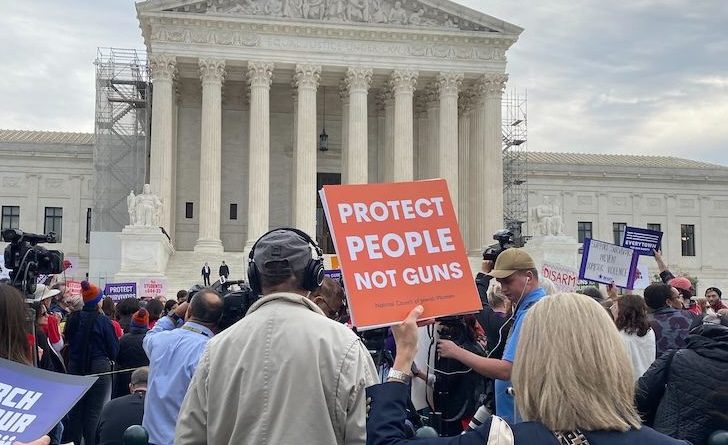Justices urged to keep gun ban to protect domestic violence survivors
By JOSIE JACK
WASHINGTON – The Supreme Court on Tuesday heard oral arguments over the constitutionality of a federal law barring people involved in domestic violence from owning guns.
At issue is a ruling earlier this year by the Fifth Circuit Court of Appeals that the 29-year-old statute prohibiting firearms ownership for those under domestic violence restraining orders was an “outlier…that our ancestors would never have accepted.”
Zackey Rahimi, a Texas drug dealer, was arrested in 2021 for the ownership of several firearms after being subject to a domestic violence restraining order by his ex-girlfriend. Rahimi claimed that the law that deems it unlawful to sell a firearm to a person who “represents a credible threat to the physical safety of such intimate partner or child” or is under a domestic violence restraining order, violates his Second Amendment rights.
The law requires restraining orders in domestic violence cases to be filed with the national background check system. Such orders are some of the criteria for halting the purchase of a gun.
Solicitor General Elizabeth Prelogar told the justices that if someone is considered irresponsible or dangerous, even if not a felon, including children or the mentally ill, that person should not possess a firearm. Prelogar said Rahimi was dangerous because he was under a domestic violence restraining order.
“Guns and domestic abuse are a deadly combination,” she said. “As this court has said, all too often, the only difference between a battered woman and a dead woman is the presence of a gun.”
Rahimi’s attorney, J. Matthew Wright, argued for adopting Founding-era legal
“There’s no history of bans for people who were part of the national community. They don’t exist,” Wright said.
Wright acknowledged there were bans of guns from so-called disfavored groups like enslaved people, but insisted that those bans should not be looked at as historical evidence.
Some justices expressed skepticism about the parameters of Wright’s argument.
“I’m a little troubled by having a ‘history and traditions’ test that also requires some sort of culling of the history so that only certain people’s history counts.” Justice Ketanji Brown Jackson said.
Chief Justice John Roberts pressed Roberts to concede that his client was dangerous. When Wright started asking for a definition, Roberts described a dangerous person as “someone who’s shooting, you know, at people.”
“That’s fair,” Wright answered.
The Rahimi case came before the court a year after the justices ruled in a previous gun rights case, New York State Rifle & Pistol Association, Inc. v. Bruen. In that case, two men challenged a New York law that required people to demonstrate a special need for an unrestricted license to carry a gun in public.
The Supreme Court ruled that the law was unconstitutional because no other constitutional right requires proof of special need and restrictions on firearms must be upheld by a historic tradition of such regulations.
Prelogar argued that the Bruen ruling was being misinterpreted in lower courts.
Outside of the Supreme Court, protesters shared personal accounts of domestic violence and urged the justices to “disarm domestic violence,” as some posters read.
Maryland Legal Aid joined other legal services and counseling organizations in a “friend of the court” brief arguing that the federal ban on firearms sales to those under protective orders should be upheld.
Amee Vora, the MLA’s director of advocacy for family law, said in a statement that the Fifth Circuit had prioritized “guns over the lives of domestic violence survivors.”
“Having represented countless low-income clients – who are disproportionately at risk for both domestic violence and gun violence – in civil protection order cases, we know firsthand the vital role that mandatory firearm removal laws play in preventing further violence in our clients’ homes and communities,” Vora said.
Another amicus brief was filed by 171 senators and House members, including Maryland Democratic Sens. Ben Cardin and Chris Van Hollen and Maryland Democratic Reps. Kweisi Mfume, Jamie Raskin, Dutch Ruppersberger, John Sarbanes and David Trone.
The lawmakers said the Fifth Circuit’s decision “infringes on Congress’s considerable legislative authority to pass common-sense gun legislation.”
“Where there is a potential conflict between a statute and the Constitution, this Court seeks to harmonize the two, not simply strike the statute down,” the brief states. “The Second Amendment context is no different – it is flexible enough to tolerate a number of gun regulations in keeping with Congress’s traditional legislative authority.”
Rahimi is currently held on $53,000 bail in Tarrant County, Texas.
The high court is set to rule on the case by the summer of 2024.

Capital News Service is a student-powered news organization run by the University of Maryland Philip Merrill College of Journalism. With bureaus in Annapolis and Washington run by professional journalists with decades of experience, they deliver news in multiple formats via partner news organizations and a destination Website.

